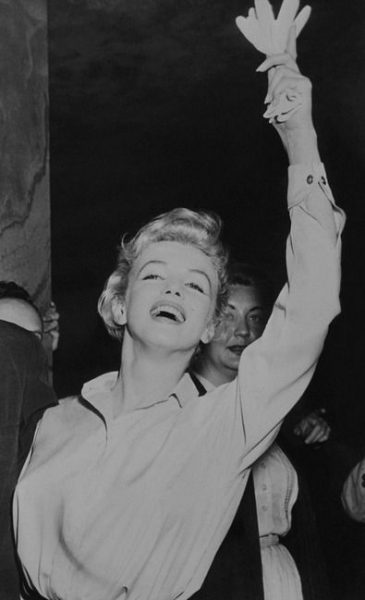
Marilyn had a lifelong affinity with the underdog and a passion for justice. Her hero was Abraham Lincoln. She was proud of her working-class origins, and defended husband Arthur Miller in his stand against red-baiting. She also supported the Civil Rights movement. In an article for Time, Lily Rothman interviews Marilyn’s biographer, Dr Lois Banner, on the subject of her ‘forgotten radical politics.’
“Those beliefs were a product of her time, Banner says: being born in 1926 meant that she was a child during the Great Depression … As a result of her own poverty and her close contact with people of other races, Monroe grew up with progressive views on race and what Banner calls a ‘populist vision of equality for all classes.’
Her background peeked through in her film roles, as she was often cast as a working girl … Even as Monroe stepped out in public in glamorous evening gowns, she favored blue jeans and flat shoes at home.
In 1956, when she married the playwright Arthur Miller, her working-class roots blossomed into full-on political fervor. In 1960, she became a founding member of the Hollywood branch of the Committee for a Sane Nuclear Policy; that same year, as she kept a home in Roxbury, Conn., she was elected as an alternate delegate to the state’s Democratic caucus. She did not hide her pro-Castro views on Cuba or her support for the then-burgeoning civil rights movement.
Broadway was not affected by McCarthyism and anti-Communist investigations to the same extent as the movie business, but Miller was called to testify before the House Un-American Activities Committee shortly before their marriage. Monroe was never called on, which Banner believes was because the anti-Communist Congressmen ‘thought she was just a dumb blonde.’ (In fact, some historians have theorized that Miller saw Monroe as a political shield.)
‘When you put it all together, [her political side] is pretty substantial. But in most of the biographies, including mine, it comes out as salt scattered on the biography, because one gets so fascinated by her psychological makeup,’ [Banner] says. ‘But the political involvements are no less real.'”